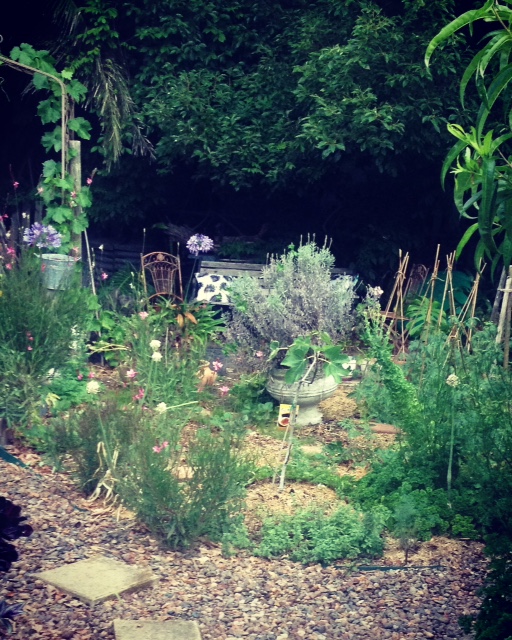I tend to be a negligent gardener of late, but Catherine, who has written previously for this blog, Solidarity and Dealing with Centrelink, found solace in gardening:
Illness means spending much more time at home and I was able to find a lot of solace in my garden. What had been a casual pastime, with results to match the small amount of hours I could devote to it, soon became a growing obsession for me.
I found great satisfaction in spending time weeding, planting, watering and feeding the garden. Even just a quiet wander through the greenery when I was too tired to do much work became an immense source of healing. A day spent working as hard as I could, with many breaks, left me exhausted but satisfied in a way that I find difficult to put into words.
I found an insatiable urge to keep extending my garden, not being satisfied with the boundaries of my property. So soon I was planting along the side of my house which is public land. I wanted to surround myself with as much greenery and natural beauty as possible, to have garden views from every door and window.
The extension of my garden into public space has meant that neighbours and passersby comment on the garden and how beautiful it is. I’ve planted fruit and herbs for people to help themselves and the garden has become not just a joy to me but also to them. Many neighbours and visitors give me plants to add to the garden, so while it has become an unplanned mish mash of plants, there is a collective pride in what has been created and grown.
I have read that there is some health benefit in getting one’s hands into the dirt, that the bacteria have a beneficial effect. I know that after a day spent working in the garden, I feel physically and emotionally exhausted but fulfilled. There is also the nurturing aspect of gardening: the knowledge that I’ve grown something from seeds or a cutting and created a whole new plant and a whole new area of beauty. This is an immensely healing and satisfying process.
Gardening also allows me to be more closely connected to the seasons. Every season brings its chores and plans. Autumn is for weeding, pruning and harvesting and planning future changes. Winter is the time to make any structural changes and to take cuttings of plants. Spring is for planting, weeding, feeding and mulching. Summer is often too hot to work much, just some watering, and by then it is time to just let the garden be and to grow.


I’m so happy that we a garden even if it’s not large. A place to “load your batteries “.
LikeLiked by 1 person
I’m not the gardener I was before Gracie but enjoy having a cuppa and watching the kiddies play.
LikeLiked by 2 people
I look forward to getting out of apartment living and having a garden again. I love looking at the “completed” project (a garden is never really completed) and taking pride in my accomplishment.
LikeLiked by 1 person
Do you have community gardens in the US? Here community gardens mean free produce and enjoying getting hands dirty. Hope you get your garden soon xx
LikeLike
I do think gardening can bring great solace. If that is yours in the picture it is lovely
LikeLike
After living in an apartment for more than 10 years, I now have a garden again since two years … I love it! And I love to dig with my hands in the mud 😉 When I am at my mum’s house, I also like to tinker around in the garden – she always tries to make me wear gloves, but I mostly refuse, until I end up with a scratch or a cut 😉
LikeLiked by 1 person
Gardening is very therapeutic and restorative. I can understand your need to be gloveless. I’m introducing my daughter to gardening, planting mustard seeds, basil, parsley. She was so excited to see little green sprouts poking through the soil…
LikeLike
Oh yes, kids love it to grow something! Mine do too. They even try out veggies they would never touch otherwise. 😉
LikeLiked by 1 person
I’m a very sporadic gardener 😉 we have to do easy plants 😀
LikeLike